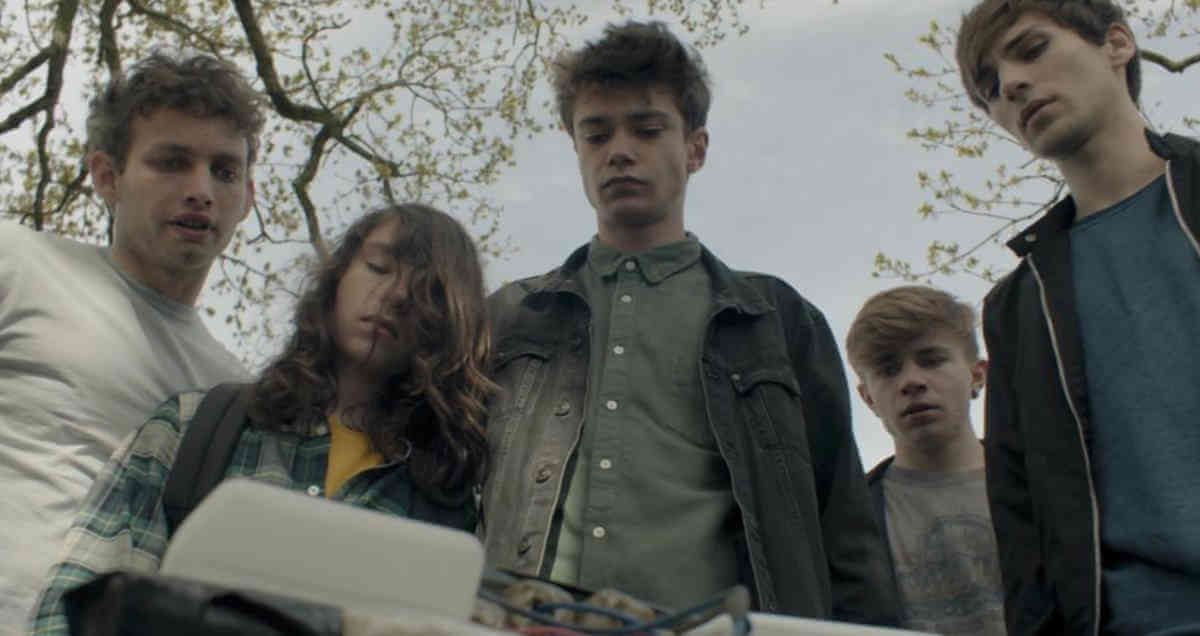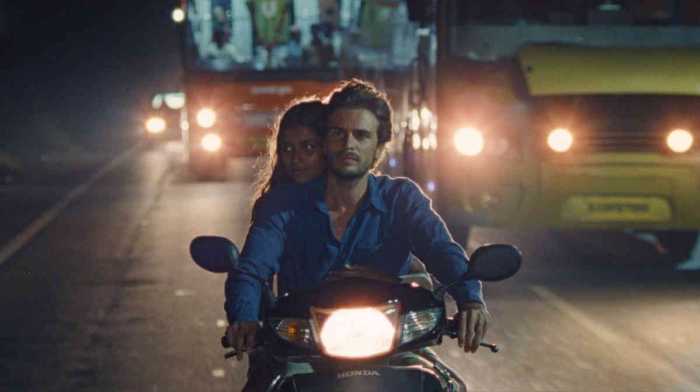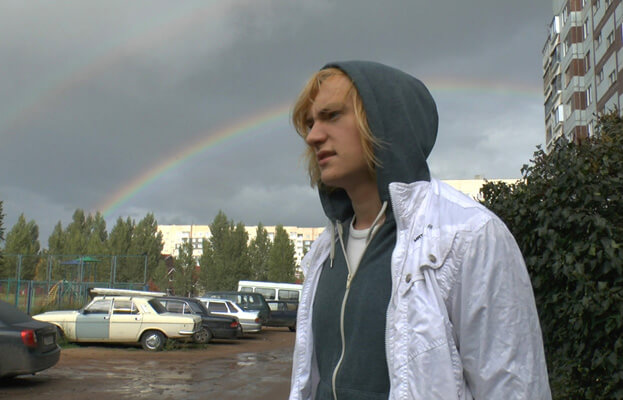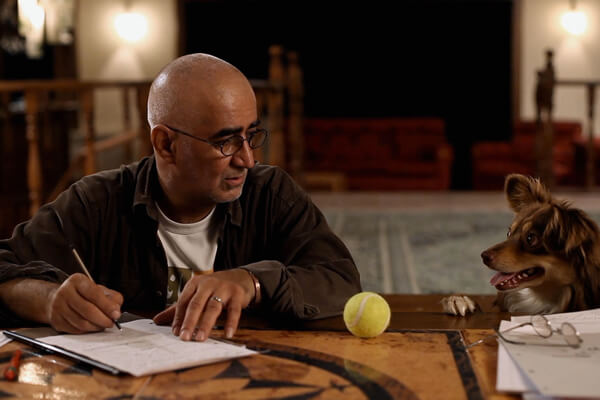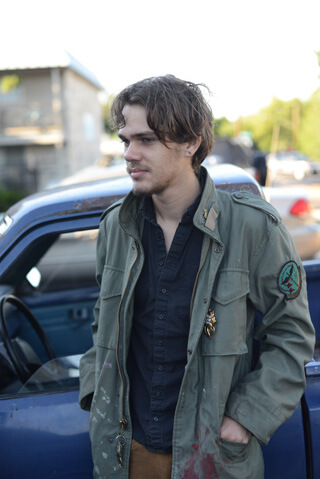Dennis Cooper has left an impressive mark on gay fiction, with his George Miles cycle and five subsequent novels. In the past two years, he’s turned to screenwriting in collaboration with French director Zac Farley, making “Like Cattle Towards Glow” and “Permanent Green Light.”
Cooper’s writing has been unfairly stereotyped by its surface interest in sex, violence, and drugs, which has led to readers and observers to overlook its emotional content and the way he’s used these subjects to explore both form — especially in a prose style that attempts to capture the vernacular speech of American youth — and questions about identity. (His novel “The Sluts,” which mostly plays out on an online forum whose members are obsessed with a mysterious hustler, seems like a premonition of the age of “fake news” and trolling.)
Although “Like Cattle Towards Glow” drew in part from his writing and used English dialogue — while Cooper now lives in Paris, he doesn’t speak French — “Permanent Green Light” focuses on a group of teenagers in the city of Cherbourg who hang around wearing suicide vests, without having any particular ideology or connection to terrorism. Despite the potentially charged subject matter, it’s a delicate and even gentle view of youth, with hushed sound design.
Cooper and Farley will present it at the Film Society of Lincoln Center on September 5, followed by a screening of Philippe Grandrieux’s excellent film “Un Lac.” The next day, they will give a talk followed by James Benning’s experimental feature “Landscape Suicide.” Gay City News spoke to both men recently.
STEVE ERICKSON: Dennis, you’re in the fairly unusual position of having your film script produced in your 60s after a long career writing novels, which you seem to have given up in favor of filmmaking. What inspired you to explore film?
DENNIS COOPER: Well, I wrote a bunch of scripts all through the years that were never made. None of the projects ever happened. Zac and I were working on various projects together. I wanted to make this porn film. No one would make it ‘cause it was too weird. This producer, Jürgen Brüning, wanted to read the script. I said to Zac, “Do you want to think about doing this with me?” So we revised the script and the producer said yes.
There was an opportunity to make this film for $40,000, as an experiment. Zac had already made videos. There was no sense at this point that we would end up making films as a series, it was more like, “Let’s try this weird project, like other things we’ve been thinking about.” We were happy enough with it that I ended up wanting to make films. I don’t think about them as screenplays, which we write together, even though that’s what they are. I don’t know about the form. It’s more like writing for theater, which I’ve been doing for a long time. It’s the language part of a larger project.
ERICKSON: You’ve also worked in a very collaborative context. At the beginning of “Permanent Green Light,” it says “un film de Dennis Cooper et Zac Farley,” but then it breaks that down to “co-written by Dennis Cooper and Zac Farley” and “directed by Zac Farley.”
COOPER: It’s totally a collaborative project, but one of Zac’s strengths is visual. Mine is writing. Zac listens to what I have to say, but his end is visual style. We write together, but I do most of it because that’s my thing. It’s not delegated. We do everything together from beginning to end. I end up being the one who does most of the writing, but I don’t think about it like I’m the screenwriter and he’s the director at all. I trust him on the visuals. I took a couple filmmaking classes in college and realized I have no gift for visualizing narrative, although I have ideas about it. Zac and I are really on the same wavelength. I know that whatever he wants to do is exactly what I’d want to do. But I’m always there, saying, “What about this angle?”
ERICKSON: There are a very few music selections: Thomas Brinkmann, Destroyer, and Pig Destroyer. I know what a big Destroyer fan you are from your blog, but how did you decide on those choices? They carry extra weight because the film’s so silent for long stretches.
COOPER: We had precise moments where there would be music. All of it would be heard by the characters. There was nothing loud added on by us as filmmakers. We knew early on we wanted to use the Destroyer song. Luckily, Dan [Bejar, the singer /songwriter behind the Destroyer] let us use it. I knew there would be a scene with a girl with a heavy metal song. We wanted an electronic track that was not danceable. We both loved this Thomas Brinkmann song, and he said okay. I knew Pig Destroyer liked my work, so they said okay too.
ZAC FARLEY: I got really obsessed with the Brinkmann track. It has all these silences in it. The performer who dances to it figured it out within the silences. It’s very complicated, and I found it very exciting.
COOPER: We didn’t want a score. That would’ve been very ugly.
ERICKSON: Your film has been compared to “Nocturama.” That seems very lazy. I think that’s just because of the characters wearing suicide vests. People are likely to think of terrorism, though, especially because it’s set in France. If the film was made in America, I think people would think of school shootings. Your film actually reminded me of North American films like “Over the Edge” and “Out of the Blue” and a sort of nihilism that came into teen pop culture with punk. Were you thinking about that at all?
COOPER: I like “Over the Edge” a lot. I don’t think it’s a nihilist film; I think it’s utopian. Roman’s a magician. He’s like David Blaine. He wants to create this spectacle that’s so amazing that people will be blown away. Committing his life to this act is a way to make the event of his disappearance even more spectacular. I was always thinking about that. In the end, it acknowledges that it didn’t work and his friends are fucked-up. His reference point is this guy who disappeared without a trace. But he doesn’t have any resources so he ends up deciding to explode himself because it’s practical.
ERICKSON: I thought about the way teenagers can flippantly flirt with images of violence and death in relation to your film. Your characters form a sense of community, and I can actually see something positive and utopian in that.
FARLEY: I definitely think the film sets up a radical possibility that ultimately fails.
COOPER: The fact that it’s a violent act is circumstantial. He could easily have done it another way, that’s just all he could think of. The suicide bomber vest and the fact that they exist in this form where they can collect them is due to suicide bombers, but no one has any interest in that thing at all. As he says in the film, the only thing that interests him about suicide bombing is that it completely disintegrates a person.
ERICKSON: At the same time, I’m sure you’re well aware that when the film goes into commercial release in France and the US, there will be tons of attempts to give it a topical political reading and people will attempt to view it as a film about terrorism.
COOPER: I don’t think they will. We haven’t had that reaction at all so far. We’ve had people mention “Nocturama” a lot.
FARLEY: Part of the project was to make a film that doesn’t lend itself to that kind of reading in an easy way, for good reason. Any kind of argument that tries to read it that way is ultimately gonna be a little bit shaky.
COOPER: It’s true that critics will jump on some lazy thing and go with it. But I have a feeling it’ll be more about nihilism and despair.
ERICKSON: The sound design seems particularly French, in the tradition of directors like Duras, Tati, Bresson, and Godard, who made their soundtracks overtly stylized whereas American narrative films tend to make their soundtracks feel naturalistic even though they’re just as artificial. Even your use of silence seems like very obvious negative space. At the same time, watching it in a theater with a powerful sound system is a very different experience from people eventually watching it on their laptops. Do you worry about that?
FARLEY: We made that film for the theater. It’s great that people can watch it at home. The work on the sound design is definitely meant for a theatrical space. Also, from the very beginning of writing and making the film, the sound emphasis was there. It’s what gets the film going. The main character has this almost synesthetic relationship between sound and emotion.
COOPER: We spent a really long time working on the sound. There was this guy we worked on for “Cattle.” We obviously didn’t have a lot of money, but he gave us as long as we wanted to get the sound right. It was filmed with the idea “We’re going to have this particular sound here,” but obviously when you shoot live sound, the shots are very much about what the sounds are going to be at that particular time. Our main problem was seagulls. We shot in Cherbourg, which is on the sea, although there’s no indication of the sea in the film. There are lots and lots of seagulls.
FARLEY: I won’t settle on a take if the sound is unusable. I’m not interested in re-recording. A lot of the times, for all the house exteriors, we literally had people going to all the neighbors who were cutting the grass and bribing them to stop. If that didn’t work, we also had someone who was knowledgeable enough to add another frequency that will add to the texture of a car passing by. It’s also about knowing how to use those accidents, which is really exciting.
COOPER: We got really lucky, because there’s a shot where Roman crosses a bridge at night. All these different cars stop and start. We got this perfect, amazing sonic take that’s the real sound which happened to exist for that shot.
ERICKSON: Was your choice of location dictated by funding?
FARLEY: We had to shoot the majority of the film in Normandy, which was fine. The film was developed in a way that we could live with the flexibility of a variety of environments. But in a number of places in France, you can find this sort of architecture and relationship between high rises and more horizontal developments. Once we got the funding from Normandy, I just went out and got super-thrilled and excited about Cherbourg and some of the landscapes that were there. It was a lucky constraint.
COOPER: As opposed to the outsides of the city, Cherbourg’s housing projects are right in the center, with houses right around them.
FARLEY: They have the best plan for projects. There’s a giant hill in the middle, and there’s this assumption that the seaside land is the more expensive land. But the hill has the best views, and the suburban housing is all around it. It’s very unusual.
ERICKSON: There are American filmmakers I know who are working on the same level that you are but they have to raise money from Kickstarter or save it from their day jobs. It amazes me to see films from, say, Ecuador by first-time directors that are co-productions with eight countries. How much have you benefited from state funding?
FARLEY: Enormously. It would’ve been close to impossible to make the film without public funding from the state. At the same time, we don’t perfectly fall in line with what French funding is built up for.
COOPER: There’s a number of different ways you can fund films. Every region has a grant. There’s also the CNC. There are foundations. If you make films for small budgets, like we are, it still takes time. You can propose a film and be sure you will eventually make it. I have so many friends who are filmmakers here who have been trying to make a film for five or six years and they just haven’t been able to do it. For that kind of money, you have to shoot in French and in France. Gaspar Noé doesn’t seem to have a lot of trouble making money. Christophe Honoré seems to get everything funded. Once you’ve established yourself as a filmmaker and you’re part of that world, you can get money to make your films.
FARLEY: Gaspar has a hugely hard time making films. He was only able to make “Climax” because the budget is three million.
ERICKSON: What kind of direction did you give to the actors, and what was their take on the characters and narrative?
FARLEY: Most of the work was finding the right people in casting. It wasn’t so much shaping them. We knew in casting that things could shape or adjust. Once we settled on who we were going to walk with, it was a matter of finding a balance between the text in the script, their performances, and the interactions between them. It was more finding the right level of focus than any style of performance.
COOPER: We’d see someone and think, “That’s the character.” They’d do line readings and then we’d sit and talk with them and find out what they’re like naturally. We sat and talked with Benjamin [Sulpice], who plays the main character, Roman, and said, “That’s it. That’s him.” It wasn’t incredibly difficult to get them to give these amazing performances. They seemed to figure out what we wanted pretty consistently. There were just details, like “Can you be a little less adamant here?” The person that was the professional actor had to take it down a bit.
FARLEY: He’s a great performer, but most of the work was balancing out the actors and energies between them. We had to make it work between two or more people.
COOPER: Théo’s [Cholbi] a professional actor. Benjamin is in acting school, but he had never been in a film before. None of the rest had any acting experience. Two were dancers. León, the girl, is the daughter of a friend. Julien [Fayeulle], who plays Ali, is a rapper. The kid with the long hair is the singer in a punk band. But none of them except Théo and Benjamin had any acting experience. I assume they all related to their characters, but we never talked to it.
FARLEY: I didn’t want them to become characters. I just wanted them to become super focused, present, and mindful. We never talked about characterization, like you have to feel this.
COOPER: Someone asked, “What are their sexual orientations?” I said, “Mostly they’re the same as the people who play them, which means I don’t know. I didn’t ask them.” The only performer we know about is Sylvain [Decloitre], who is openly gay.
PERMANENT GREEN LIGHT | Directed by Dennis Cooper and Zac Farley | In French with English subtitles | MPM Premium | Film Society of Lincoln Center, Walter Reade Theater, 165 W. 65th St. | Screening: Sep. 5 at 6:30 p.m. | Francesca Beale Theater, 145 W. 65th St. | Dennis Cooper Talk: Sep. 6 at 7 p.m. | filmlinc.org

